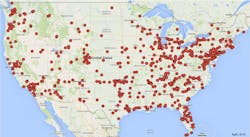If you want to be a serial killer, then being a long-haul trucker is an excellent career choice, according to the FBI.In a recent blog post and accompanying video about the Highway Serial Killings (HSK) initiative, the nation's top law enforcement agency noted: "If there is such a thing as an ideal profession for a serial killer, it may well be as a long-haul truck driver."FBI Crime Analyst Christie Palazzolo, who was quoted in the blog and appeared in the video, added that truck driving is an honorable profession and the overwhelming majority of drivers are not murderers. "But it does happen, and the pattern is unmistakable," she said. The Highway Serial Killings initiative dates to 2004 when an analyst from the Oklahoma Bureau of Investigation saw a pattern of murdered women's bodies being dumped along I-40 in Oklahoma, Texas, Arkansas, and Mississippi. The cases were referred to the FBI's Violent Criminal Apprehension Program (ViCAP) to see if this body-dumping pattern existed on other roads. It did, and the HSK initiative was established although the FBI did not make the program public until 2009. (Asked to elaborate on the recent blog post and status of the HSK initiative, an FBI official stated in an email: "The Behavioral Analysis Unit, which oversees the HSK initiative, is declining interviews and questions about the program.")Since the program began, FBI analysts have produced a roster of more than 750 murder victims found along or near U.S. highways. About 450 potential suspects, many of them truck drivers, have also been identified.Of course, truckers are not the only killers to use the anonymity and convenience of the open road. In her 2012 book ‘Killer on the Road,’ author Ginger Strand recounts the stories of non-trucker serial killers, but also states in her chapter on truckers that at least 25 truck drivers are in prison, found guilty of being serial killers. In their studies, the FBI publicly notes that most victims are women who are "living high-risk, transient lifestyles, often involving substance abuse and prostitution. They’re frequently picked up at truck stops or service stations and sexually assaulted, murdered, and dumped along a highway."Said Palazzolo: "This is not to say that every truck driver is a serial killer obviously, but when we see them come up, when we know we’ve identified one as a subject, they’re extremely difficult to track down, and the mobility of their occupation allows them access to so many different areas of victim selection. And then victim release locations." Tod Burke, professor of criminal justice at Radford University in Virginia and a former Maryland police officer agrees with the FBI's assessment of victim profiles. "They're easy prey. Truck drivers also could be out traveling late at night. There's not a lot of traffic, so there's not a lot of visibility. If they do pick up a hitchhiker, nobody would pay attention."He also concurs that truck drivers make ideal serial killers because of their mobile job requirement coupled with a lack of supervision. "They have the means of transportation. They have the space … You could bring them [victims] into the truck. You could have activities with them in the truck, sexual or otherwise. You could go to another location and do a drop off."It's widely accepted in law enforcement circles that some criminals, such as pedophiles, purposely seek out jobs that get them closer to their victims. Is this the case with truck drivers?"I have not come across that," Burke said. "I think you would have to interview truck drivers who are serial killers and ask them. It would have to be self-disclosed information."In the FBI blog post, Palazzolo said that with more trucks on the road, highway serial killings may escalate. "According to the Department of Transportation, the number of truck drivers on the road in the next 20 years is going to grow exponentially. So, if we’ve already identified a population from which we are getting a significant number of offenders, and if we are going to be seeing more and more trucks on the road, the potential for additional highway serial killings is definitely there."
About the Author

Larry Kahaner
Larry Kahaner is an author, journalist, and former FleetOwner contributor.
Sign up for our eNewsletters
Get the latest news and updates
